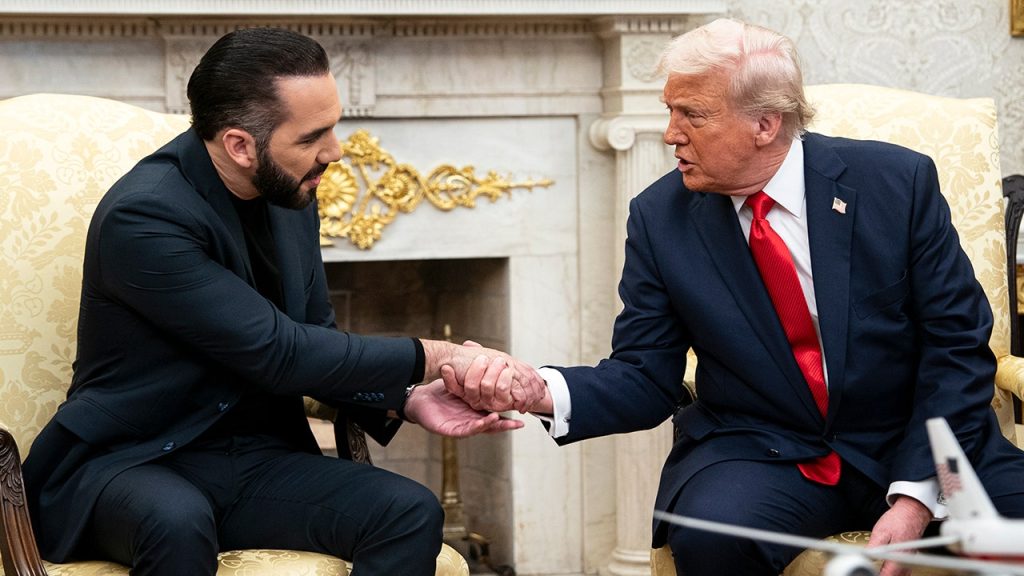El Salvador’s President Nayib Bukele met with U.S. President Donald Trump at the White House on April 14, 2025, reinforcing their collaborative efforts against crime and violence. The meeting was characterized by mutual respect and admiration, with Trump praising Bukele and highlighting their shared focus on enhancing security in their respective nations. This visit comes at a time when both leaders stress the need to combat gang violence and other security threats in the region.
| Article Subheadings |
|---|
| 1) Details of the Meeting at the White House |
| 2) Trump’s Praise of Bukele’s Leadership |
| 3) The Focus on Crime and Security |
| 4) Deportation of Violent Criminals |
| 5) The Future of U.S.-El Salvador Relations |
Details of the Meeting at the White House
President Nayib Bukele visited the White House on April 14 to discuss critical bilateral issues with President Donald Trump. The meeting took place in the Oval Office, where both leaders addressed the need for enhanced cooperation primarily focused on law enforcement and security strategies. Attendees included senior advisors from both administrations, indicating the seriousness with which both parties regard this diplomatic engagement. The meeting was highlighted by Bukele’s expression of gratitude towards Trump, as evidenced by a tweet he posted afterward that read: “I miss you already, President T.”
Trump’s Praise of Bukele’s Leadership
During the meeting, President Trump complimented Bukele, referring to him as one of the most effective leaders in the region. He stated, “The Salvadoran people have one hell of a president,” emphasizing Bukele’s decisive approach to governance. This admiration is mutual, with Bukele reflecting on Trump’s leadership as impactful and striving for a collaborative atmosphere between their two countries. Their exchanged pleasantries and recognition of each other’s leadership styles set a friendly tone for the discussions.
The Focus on Crime and Security
A significant part of the dialogue revolved around strategies to combat escalating crime rates and violence in both countries. Trump argued that “the time is now to liberate 350 million Americans” by tackling terrorism and crime more firmly, pondering the inclusion of “homegrown criminals” in future collaborations. Bukele’s approach to handling violence in El Salvador, particularly with gangs like MS-13, was deemed an effective model by Trump. During the meeting, both leaders agreed upon the importance of strengthening law enforcement mechanisms to safeguard their citizens.
Deportation of Violent Criminals
In relation to security cooperation, both leaders discussed the recent trends of deportation of violent offenders back to El Salvador. Trump elaborated on the successful deportations of dangerous gang members to Salvadoran prisons, believing that this has positively contributed to the safety and security of both nations. The U.S. Secretary of State, Marco Rubio, echoed these sentiments, highlighting that these measures have strengthened U.S.-El Salvador relations while enhancing security measures in both territories. The strategic relocation of these criminals is viewed as a transitional step towards a larger goal of curbing gang violence.
The Future of U.S.-El Salvador Relations
As the meeting concluded, both leaders emphasized the need for a sustained partnership that could advance mutual interests in security and governance. They recognized that ongoing collaboration is necessary for long-term success in addressing challenges related to crime and immigration between the nations. Furthermore, the exchange of ideas during this meeting could lay a foundation for future diplomacy, with Bukele expressing a desire for more collaborative efforts. This partnership between the United States and El Salvador could serve as a model for engagements with other countries facing similar challenges.
| No. | Key Points |
|---|---|
| 1 | President Bukele met with President Trump to discuss security and crime rates. |
| 2 | Trump expressed admiration for Bukele’s leadership and effectiveness in governance. |
| 3 | The meeting focused on strategies to combat crime, including the deportation of violent criminals. |
| 4 | Both leaders agreed on the importance of continued collaboration for enhanced law enforcement. |
| 5 | Future U.S.-El Salvador relations will likely focus on security partnership and governance. |
Summary
The meeting between Presidents Bukele and Trump represents a significant step toward reinforcing bilateral relations between El Salvador and the United States, particularly in the area of security and crime prevention. Both leaders’ recognition of one another’s leadership and commitment to fighting violence in their respective countries could pave the way for enhanced collaboration. The iteration of shared goals indicates a progressive outlook for ongoing diplomatic efforts between the two nations amid mounting challenges related to crime and governance.
Frequently Asked Questions
Question: What outcomes were expected from the meeting between Bukele and Trump?
The meeting aimed to solidify ties between El Salvador and the U.S. through collaboration on security strategies to combat crime and violence.
Question: How does Bukele’s leadership style differ from past leaders in El Salvador?
Bukele’s leadership is characterized by a more aggressive stance against crime and corruption, which has garnered significant domestic support and international attention.
Question: Why is the deportation of violent criminals a contentious issue?
Deportation of violent criminals raises concerns about human rights, potential gang retribution, and the effectiveness of their reintegration into society in El Salvador.


